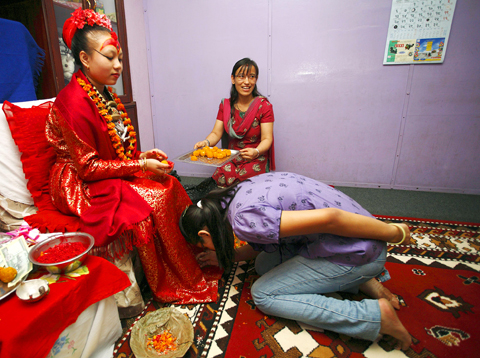Perhaps divine intervention palyed a role.
A Nepali girl revered by many as a “living goddess” has become the first sitting deity to pass the high school leaving certificate exam, setting her on course for a career in banking.
Chanira Bajracharya, 15, called “Kumari,” was among nearly half a million children who took the exams in March. The results were declared late on Friday.

PHOTO: REUTERS
“She scored 80.12 percent marks in the exam,” said Abha Awale, a teacher who gave private tuition to the girl in her temple as she is not allowed to mingle with outsiders.
“This is a distinction [top grade],” she said.
Bajracharya has already scored high marks among devotees in the ancient town of Patan, south of Kathmandu, where she rides in decorated chariots 18 times a year during Hindu and Buddhist festivals.
She has been Kumari of Patan for nine years now.
Relatives and friends gathered outside Bajracharya’s red brick house yesterday to greet the Kumari with folded hands.
Bajracharya, who has a third eye painted on her forehead, said in a rare interview in April she wanted to study commerce or accounting and work in banking.
Former Kumaris, considered incarnations of the Hindu goddess Kali, have gone on to work or got married after they retired, which is usually at the onset of puberty.
Girls from Kathmandu’s Newar community are chosen by Buddhist priests to serve as “living goddesses,” and confined to temples in the three ancient cities of the Kathmandu valley.
Critics say the centuries-old tradition denies them a normal life and leaves them unprepared to face real life after retirement.
Two years ago, Nepal’s Supreme Court ordered the government to ensure basic healthcare and education for the Kumaris.
Early this week, the Nepali government raised by a quarter the maintenance allowance provided to the Kumari and said it would bear the expenses for her education.

Indonesia yesterday began enforcing its newly ratified penal code, replacing a Dutch-era criminal law that had governed the country for more than 80 years and marking a major shift in its legal landscape. Since proclaiming independence in 1945, the Southeast Asian country had continued to operate under a colonial framework widely criticized as outdated and misaligned with Indonesia’s social values. Efforts to revise the code stalled for decades as lawmakers debated how to balance human rights, religious norms and local traditions in the world’s most populous Muslim-majority nation. The 345-page Indonesian Penal Code, known as the KUHP, was passed in 2022. It

‘DISRESPECTFUL’: Katie Miller, the wife of Trump’s most influential adviser, drew ire by posting an image of Greenland in the colors of the US flag, captioning it ‘SOON’ US President Donald Trump on Sunday doubled down on his claim that Greenland should become part of the US, despite calls by the Danish prime minister to stop “threatening” the territory. Washington’s military intervention in Venezuela has reignited fears for Greenland, which Trump has repeatedly said he wants to annex, given its strategic location in the arctic. While aboard Air Force One en route to Washington, Trump reiterated the goal. “We need Greenland from the standpoint of national security, and Denmark is not going to be able to do it,” he said in response to a reporter’s question. “We’ll worry about Greenland in

PERILOUS JOURNEY: Over just a matter of days last month, about 1,600 Afghans who were at risk of perishing due to the cold weather were rescued in the mountains Habibullah set off from his home in western Afghanistan determined to find work in Iran, only for the 15-year-old to freeze to death while walking across the mountainous frontier. “He was forced to go, to bring food for the family,” his mother, Mah Jan, said at her mud home in Ghunjan village. “We have no food to eat, we have no clothes to wear. The house in which I live has no electricity, no water. I have no proper window, nothing to burn for heating,” she added, clutching a photograph of her son. Habibullah was one of at least 18 migrants who died

Russia early yesterday bombarded Ukraine, killing two people in the Kyiv region, authorities said on the eve of a diplomatic summit in France. A nationwide siren was issued just after midnight, while Ukraine’s military said air defenses were operating in several places. In the capital, a private medical facility caught fire as a result of the Russian strikes, killing one person and wounding three others, the State Emergency Service of Kyiv said. It released images of rescuers removing people on stretchers from a gutted building. Another pre-dawn attack on the neighboring city of Fastiv killed one man in his 70s, Kyiv Governor Mykola